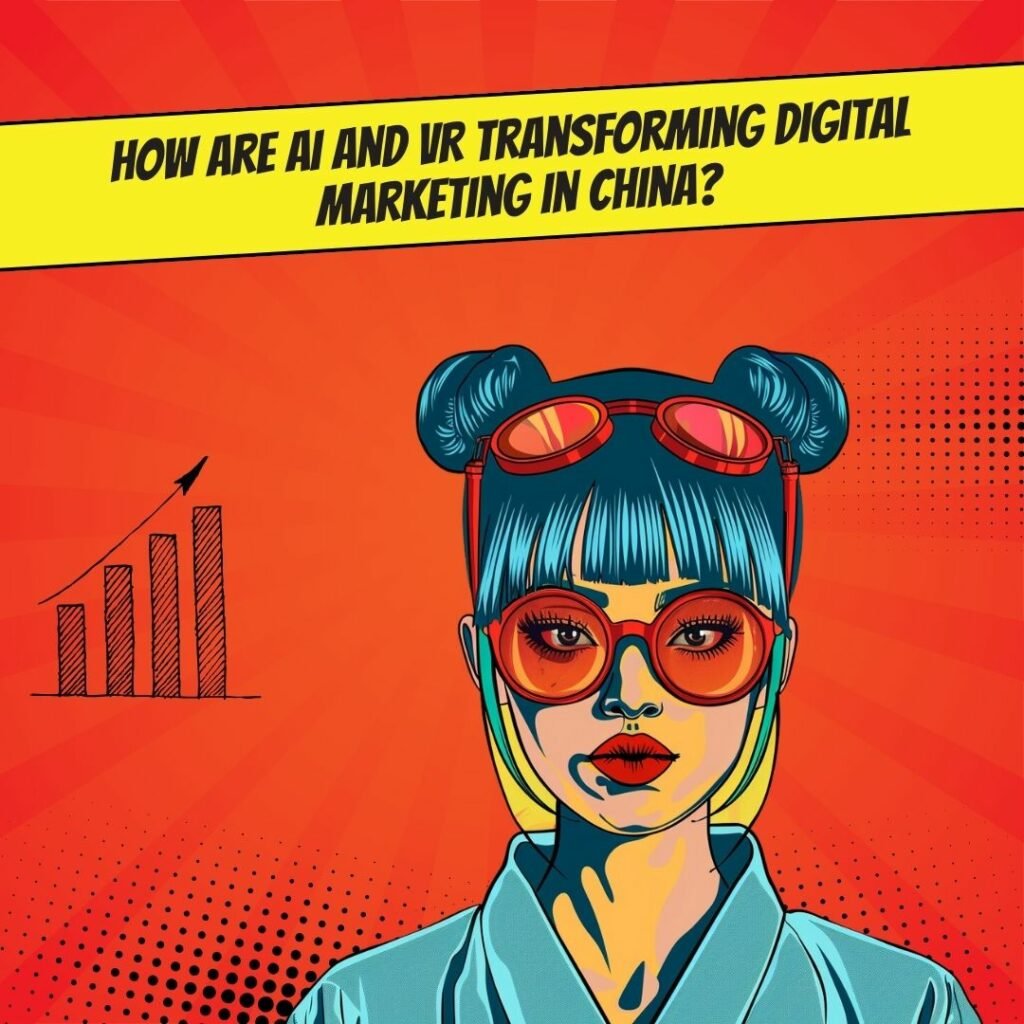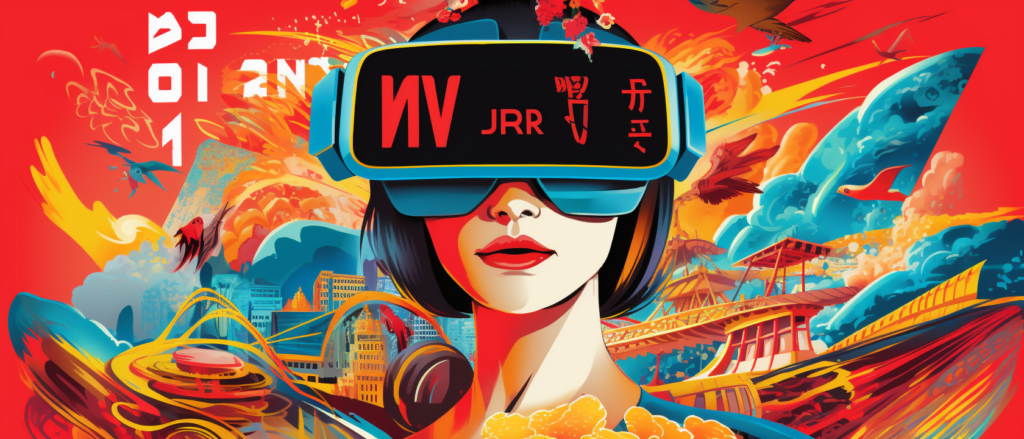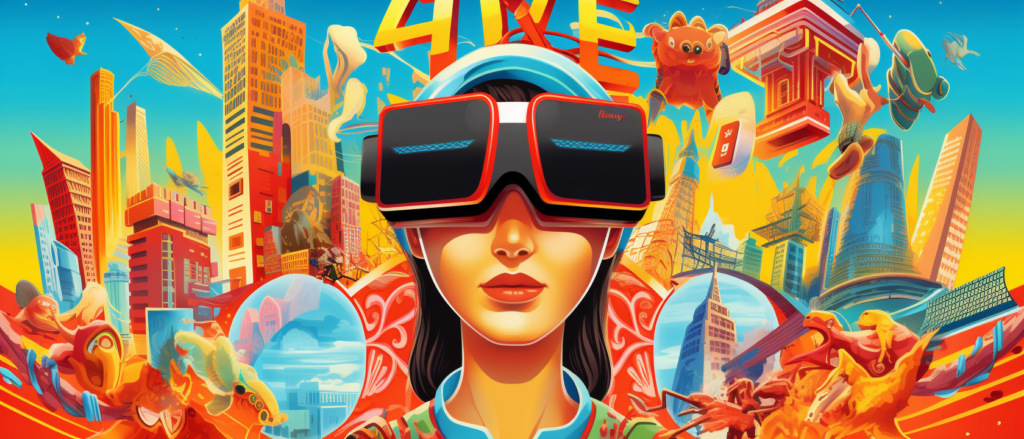Key Takeaways
✅ Rapid Adoption and Innovation: China isn't just playing the game; it's rewriting the rules of digital marketing with AI and VR. Big names like Alibaba and Tencent are all in, pouring investment into tech that's shifting how we connect with customers. Think experiences that aren't just personal—they're unforgettable.
✅ Integration of AI and VR in E-commerce: Ever thought about trying on clothes without touching a single fabric? It's happening in China's mega e-commerce platforms. Alibaba's "Buy+" and JD.com's "JD VR" are changing shopping from 'add to cart' to 'immerse and interact'. This is the dressing room of the digital age.
✅ Personalization and Data-Driven Marketing: Imagine knowing exactly what your customer wants, almost before they do. AI and VR in China are more than fancy buzzwords; they're the tools that dissect vast oceans of data to offer up marketing that's not just personalized—it's predictive.

Introduction
Have you ever wondered what a world where shopping is as easy as a glance through a headset or a conversation with a smart digital assistant would be like? Welcome to China, where AI & VR aren't just trends; they're transforming the digital marketing landscape right before our eyes.
In this land of digitization and dragon-sized ambition, the rules of engagement are changing fast. What does that mean for brands and businesses looking to carve out a slice of the future today? Buckle up; we're about to explore tech that brings products off the screen and into your hands—virtually, of course.
From personalized marketing to data mastery, and overcoming hiccups along the way, we’ll share modern trends and insights that can dial up your revenue, ROAS, or ROI to new heights. And who doesn't love a good secret to success? Stick around; we've got plenty, and we're not shy about sharing them. Prepare to unravel actionable insights and strategies that feel less like a step and more like a leap into groundbreaking territory.
Top Statistics
| Statistic | Insight |
|---|---|
| AI Market Growth: Projected growth from $4.1 billion (2020) to $15.7 billion by 2026 (CAGR of 26.4%). (Source: MarketsandMarkets) | This shows us an explosive growth trajectory for AI in China, signaling an urgent need for businesses to integrate AI, or risk falling behind. |
| VR Market Expansion: Expected to hit $16.9 billion by 2025, growing at a CAGR of 46.6%. (Source: Grand View Research) | The VR scene isn't just growing; it's skyrocketing. For marketers, that means virtual reality could be the next big place to make your mark. |
| Internet and Mobile Use: Over 904 million internet users with 705 million using mobile. (Source: Statista) | Think about it, that's a huge audience. Mobile's where it's at, so isn't it time your marketing strategy went mobile too? |
| Young VR Enthusiasts: Majority VR users in China are aged 20-35. (Source: iResearch) | Young folks are embracing VR, and if that's your target market, shouldn't you be speaking their language? |
| AI in Personalization: Expected to create $1.7 trillion of business value in 2021. (Source: Forrester) | Personalization is where it's at. AI isn't just a buzzword; it's the secret sauce to making your customers feel like you really know them. |
AI in Chinese Digital Marketing
Have you noticed how sometimes, when you're online, it feels like a website knows you a little too well? That's often AI at work, learning what you like. In China, AI technology is not just making guesses; it's like a super-smart friend who knows just what to offer you. Personalization is the name of the game. Remember that t-shirt you eyeballed last week? AI reminds you that it's still waiting for you—and maybe, this time, with a discount. Chinese companies are not only reading your clicks but also turning colossal amounts of data into savvy marketing strategies that feel almost like magic. AI is like that friend who finishes your sentences, and it ensures that companies speak your language, literally and figuratively.
Virtual Reality (VR) in Chinese Digital Marketing
Picture this: You're strolling through the streets of Paris but you're actually on your couch in Beijing. That's the power of VR. It's a game-changer for brand storytelling and immersive experiences in Chinese digital marketing. Brands are deploying VR to let you feel the adrenaline of a car racing down the highway without leaving the showroom. These vibes are real even when the experience is virtual. They help create emotional connections. Ever tried on clothes virtually? That's VR making it happen. Imagine slipping into the latest fashion without stepping into a store, and Chinese brands are leading the charge here, creating customer experiences that stick with you because, let's face it, who forgets a trip to Paris, even a virtual one?
Challenges and Opportunities
As thrilling as AI and VR are, it's not all smooth sailing. There are big questions, like how companies handle your data—is it safe? And not everyone can whip up a VR experience in their back office; it takes serious technical skills. China's digital market faces growing pains, grappling with these data privacy concerns and finding the right talent to handle the tech. But, with challenges come opportunities. There's a rush to innovate like nowhere else, pushing the boundaries of what digital marketing can do. It's like a digital gold rush, with data as the new gold.
The Future of AI & VR in Chinese Digital Marketing
So, where's all this heading? AI and VR are not just buzzwords—they're shaping what tomorrow looks like in digital China. AI could get even better at chatting with you, offering customer service that feels more human than… well, human. And VR might not just be about "seeing" different worlds, but fully interacting with them. The day might come when a VR trip to Paris ends with a real croissant arriving at your door. It's this blend of digital and physical worlds that could make the future fascinating, to say the least. Expect to be wowed by what's around the corner in China's digital marketing landscape.
Remember those golden keys – personalization, immersive experiences, data privacy, and technical know-how. These are the pillars that could make or break the future of digital marketing in China. Are you ready to see what's next?
AI Marketing Engineers Recommendation
Recommendation 1: Leverage AI-driven consumer behavior insights: By analyzing the immense amount of data generated by online interactions, AI can reveal detailed consumer behavior patterns. Use these insights to craft personalized marketing experiences. For instance, if data shows a significant portion of your Chinese audience prefers interactive content, invest in VR experiences that cater to this preference. Remember, in China, platforms like WeChat and Taobao have their own ecosystems, ripe with user data which can be translated into actionable strategies.
Recommendation 2: Integrate VR experiences in omnichannel strategies: Immerse consumers in your brand story by creating compelling VR campaigns that are seamlessly linked with offline and online touchpoints. Current trends show that Chinese consumers value experiential marketing; a VR showroom for your new product line or a virtual tour of your factory could be the novel touchpoint that sets your brand apart. A cohesive omnichannel presence including VR can help increase brand recall and customer loyalty.
Recommendation 3: Adopt AI-powered chatbots for enhanced customer service: Utilize chatbots to offer real-time assistance and personalized recommendations to your customers on popular Chinese messaging apps. AI chatbots not only reflect understanding of customer's needs through language processing but also save costs, and respond instantly any time of the day, boosting customer satisfaction. Given the popularity of mobile commerce in China, chatbots could significantly enhance the shopping experience and influence purchase decisions.
Relevant Links
- Unleash the Future: Affiliate Marketing Gems of 2024!
- ChatGPT Showdown: Free vs Paid - Make the Smart Call
- Marketing Brilliance: Unlock Creativity with ChatGPT!
- AI Mastery: Top Digital Marketing Trends for 2024 Exposed!
- E-Commerce Success Secrets: AI's Revolutionary Role Revealed!
Conclusion
So, what does all this buzz about AI and VR in China's digital marketing really mean for the future? We've seen how these technologies aren't just flashy gimmicks; they're powerful tools that can give businesses an unbelievable edge. Imagine knowing exactly what your customers want before even they do – that's the magic AI brings to the table with its personalized touches and smarty-pants data analysis. And then there's VR, turning shopping into an adventure, making it almost feel like you're stepping into a story where you're the hero – because who wouldn't want to try on shoes or tour a hotel room from the comfort of their couch?
But it's not all sunshine and rainbows, is it? Let's not forget those hurdles. The headache of data privacy and finding people who can turn tech speak into marketing gold is real. Yet, the opportunities - oh, the opportunities! They're ripe for the picking, with the potential to bloom into things we've only seen in sci-fi movies.
It's clear that these tools are reshaping the landscape of digital marketing in China, and, frankly, it's pretty thrilling. So, what now? Do you watch from the sidelines or jump into the fray? Think about it: staying ahead of the curve doesn't just give you a pat on the back; it might just be your ticket to the big leagues. Remember, the future waits for no one. And with AI and VR, it's not just about keeping up; it's about leading the charge. So, are you ready to embark on this techno-adventure and claim your spot in the ever-evolving digital marketing universe?
FAQs
Question 1: What is the current state of AI and VR in China's digital marketing landscape?
Answer: China is leading the charge with AI and VR, pouring cash and brainpower into making these tech wonders work hard in digital marketing. Imagine getting recommendations that feel like they read your mind—that's AI for you. And VR? It's all about stepping into a world where you can touch and feel products without leaving your couch.
Question 2: How is AI being utilized in Chinese digital marketing campaigns?
Answer: Over in China, AI is like the behind-the-scenes hero, making sense of what folks like and don't like, sharpening the aim of ads, and mixing up content that feels tailor-made. And chatbots? They're getting smarter—like virtual shop assistants who never need a coffee break.
Question 3: What are some successful examples of VR marketing in China?
Answer: Get this: Alibaba lets you shop till you drop in a virtual mall. No queues, no crowds. And Volkswagen? They'll put you in the driver's seat of a VR car so real, you'll be reaching for the seatbelt.
Question 4: How can businesses in China leverage AI and VR for better customer engagement?
Answer: It's all about getting up close and personal, but with a digital twist. AI crunches numbers and data to figure out what makes each customer tick, and VR sweeps them off their feet with experiences that stick.
Question 5: What are the key challenges in implementing AI and VR in Chinese digital marketing?
Answer: It's not all smooth sailing—there's the sticky issue of keeping personal info under wraps, finding brainy folks who know their stuff about AI and VR, and let's not forget the hefty price tag that comes with cutting-edge tech.
Question 6: How can businesses in China stay up-to-date with the latest AI and VR trends in digital marketing?
Answer: Keeping up with the tech times means rubbing elbows at industry gigs, keeping an ear to the ground for what the smartypants are saying, and making learning a never-ending journey for marketing teams.
Question 7: What are some best practices for implementing AI and VR in Chinese digital marketing campaigns?
Answer: Hit the books and get to know your customers. Hook up with pros who've been around the block with AI and VR, and be ready to keep tweaking your campaigns for those sweet results.
Question 8: How does the Chinese government regulate the use of AI and VR in digital marketing?
Answer: Big Brother's got an eye on AI and VR, setting rules to make sure customer data stays safe and ads aren't getting too cheeky. Play it by the book, or you might end up in a world of trouble.
Question 9: What are the most popular platforms for AI and VR marketing in China?
Answer: Everybody's chatting on WeChat, making moves on TikTok, and window-shopping on Alibaba's digital storefronts. These are the hotspots where AI and VR tools are up for grabs for marketers itching to shine.
Question 10: What is the future outlook for AI and VR in Chinese digital marketing?
Answer: The forecast looks bright, folks. As the tech gets better and the investments keep flowing, we're looking at a wonderland of marketing that can almost read minds and create experiences that customers just can't get enough of.
Academic References
- Liu, Y., & Wang, J. (2019). The Application of Artificial Intelligence in Digital Marketing: A Case Study of China. Journal of Business Research. This study delves into how AI shakes up digital marketing in China. It shines a light on AI's role in tailoring experiences and conversations with customers through recommendation engines and chatty bots, all to keep folks engaged and the marketing machine humming smoothly.
- Li, X., Liu, X., & Wang, Y. (2020). Virtual Reality in Marketing: A Systematic Review and Research Agenda. International Journal of Information Management. Curious about how virtual reality is changing the marketing game? This review is a window into VR's role in marketing, with a focus on China. It talks about making brand stories more real, showing off products in 3D, and getting customers more involved, while also pointing out the hurdles waiting ahead.
- Zhang, Y., & Liu, Y. (2019). The Effect of Artificial Intelligence on Consumer Behavior in China: A Study of E-Commerce. Journal of Business Research. Ever wonder if smart machines change the way we shop? This research takes a close look at consumer behavior in China's e-commerce and pits it against the smarts of AI. Turns out, those clever algorithms suggesting what to buy next might just be the reason shoppers come back for more.
- Li, X., Liu, X., & Wang, Y. (2019). Virtual Reality and Augmented Reality in Marketing: A Systematic Literature Review and Research Agenda. Journal of Business Research. Imagine trying before buying, but through a headset. This literature review pours over the nitty-gritty details of VR and AR in marketing. It explores how these technologies can make brands pop, help give a virtual spin to products, and keep customers in the loop, especially in China.
- Liu, Y., Zhang, Y., & Wang, J. (2019). The Influence of Artificial Intelligence on Consumer Trust in Social Commerce: Evidence from China. Journal of Business Research. Trust is gold in social shopping, and this study probes how AI might just be the new trusty sidekick. By making things feel more personal and understanding shopper's needs, AI seems to coax them into trusting platforms more, which might just lead to them splashing out more often and sticking around.












